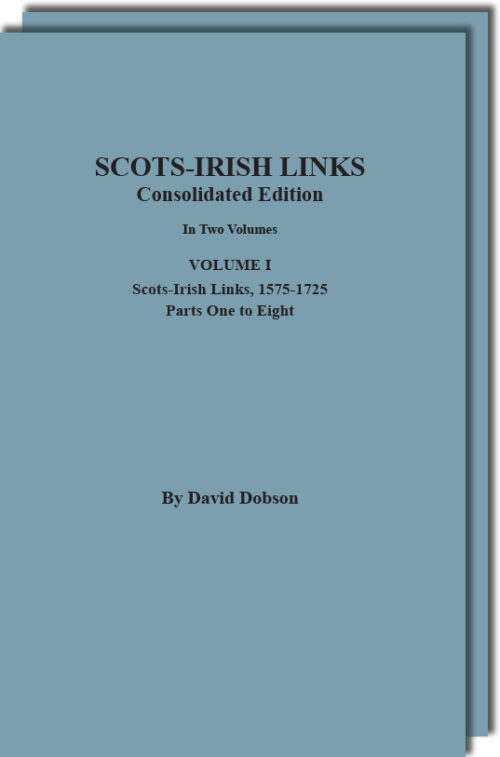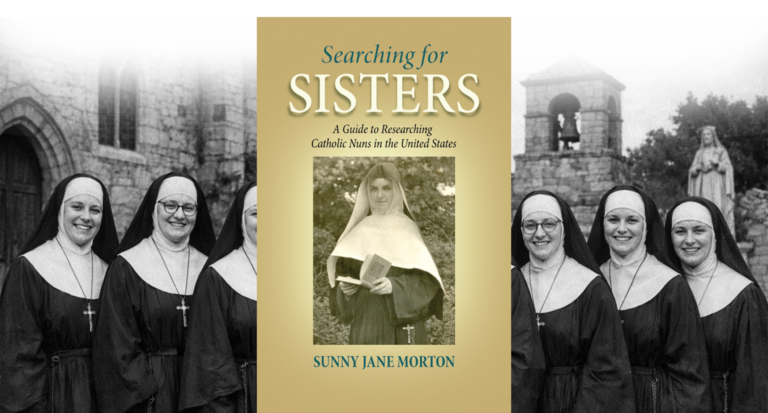
Early Reviews Tout Scots-Irish Links Consolidated Edition, by David Dobson
Over the past month we received three positive reviews of the new consolidated, indexed edition of Scots-Irish Links, 1575-1900, by Dr. David Dobson. In the aggregate the reviewers appreciate that we went to the trouble and expense of having the books fully indexed, thereby identifying over 30,000 persons connected to the founding families of the Ulster Plantation. They also appreciated the range of sources consulted by Dr. Dobson as well as the kinds of identifying information associated with the main entries in the consolidated volumes. The reviewers are the popular bloggers Linda Stufflebean and Marian B. Wood, as well as the longstanding Lubbock, Texas, columnist Marleta Childs. We have excerpted each of their reviews below.
From “Climbing My Family Tree,” by Marian B. Wood, April 21, 2022.
“My husband’s family tree includes the McClure family from Donegal but originally from Isle of Skye, ancestors who are known as Scots-Irish.
So when the Genealogical Publishing Company kindly sent me a review copy of the two volumes that make up David Dobson’s latest work, I was delighted to take a look.
Disclaimer: Although I received this publication for free, please note that the opinions in this post are entirely my own.
Consolidated index is handy
Scots-Irish Links, Consolidated Edition, consists of two volumes, each more than 900 pages, reprints of carefully-researched works that were previously published. If you have an intense interest in Scots-Irish genealogy and need to consult surname-based research going back hundreds of years, these pricey volumes might be worth the investment.
What makes them particularly useful is that each volume contains a consolidated index. Instead of having to look up names in more than a dozen briefer books researched by Dobson in earlier years, today the reader can flip through a single index at the end of each volume.
Searching for McClure names in County Donegal, I found a listing for Robert McClure, as well as a listing for John McClure.
These clear, concise entries told me not just surname and given name but also the location and the year, along with an abbreviated reference I could follow back to the source.
More about sources
Dobson provides a listing of references indicating the meaning of the abbreviated citations in each volume (e.g., PCC= Prerogative Court of Canterbury, London; RPC=Register of the Privy Council of Scotland).
As a researcher based in New England, I am not familiar with most of these sources. It’s been a good learning experience to follow up—especially considering that I hope to discover other Scots-Irish ancestors from my husband’s family tree in some of these sources!”
From “Kinsearching,” by Marleta Childs, April 17, 2022
“This consolidated edition improves upon the original booklets in several respects. For example, staying abreast of the publication announcements of all the books in the series posed a problem for family researchers . . . Because the author arranged the names of the main subjects in alphabetical order and did not index other persons mentioned in the entries, valuable relationship information and other clues could easily be missed. That obstacle is overcome by a new full-name index [that] identifies everyone, including spouses, children, ship captains, and military officers . . .
For beginning researchers who may not be aware of Dobson’s work, he obtained his information from a wide assortment of materials in various archives and libraries. His sources include wills, testaments, deeds, sasines, port books, rent rolls, family papers, apprenticeship records, burgess rolls, estate papers, church records, monumental inscriptions, university registers, contemporary journals, newspapers, and government records.
Details gleaned about individuals vary widely, but most entries supply the name of the man or woman, place of residence, occupation, a date, and the source citation. Numerous entries my furnish additional facts, such as name of spouse or parent, while a few others may provide fascinating reading in their own right when they delve further into an individual’s life story . . . .”
From “Empty Branches on the Family Tree,” by Linda Stufflebean, March 31, 2022.
“I have reviewed David Dobson’s books in past posts and it never ceases to amaze me how what a prolific researcher he is.
Today’s review is more accurately a notice of two newly published volumes, which are a consolidation of previous works by David Dobson – 17 earlier volumes, to be specific, all related to Scots-Irish ancestors . . .
Each volume is massive, containing 900+ pages per book with an all-name index. personal details are presented in a simple, straightforward manner, generally short in length, but always with a source citation.
Examples:
Kennedy, Anthony, granted Irish denization on 29 January 1611
Erwin, Robert of Cregill, a yeoman and a horse thief, 1611
Verner, Benjamin of Killgavinache, County Antrim, a deed, 1694
Stewart, Andrew Thomas, parish of Ballyclog, County, Tyrone, matriculated at Glasgow University on 14 November 1745, Earl of Castlestewart, ‘descended from Robert II, King of Scotland,’ died at Stewart Hall, County Tyrone, 26 August 1809
Stein, John, married Miss Colclough, only daughter of Charles Colclough in Dublin in 1811
Each statement is sourced with the list of abbreviations found at the beginning of each volume. There is a second key for military titles.
Most entries focus exclusively on people who lived in Scotland and/or Ireland. There were very few instances where North America, or anywhere else, was mentioned in the entries.
There are mentions of marriages, education of young men at schools and universities, names found in indentures and deeds, military connections, some death notices, merchants, and seamen affiliated with various sailing ships and much more.
This is a fabulous reference set for anyone with significant Scots-Irish heritage, who is researching ancestors who lived in Scotland or Ireland and may, or may not, have ever emigrated to a new home.
These volumes are not inexpensive, but for those who would like to have all 17 books on their home reference shelf, this new consolidated edition is the way to go . . . .”




